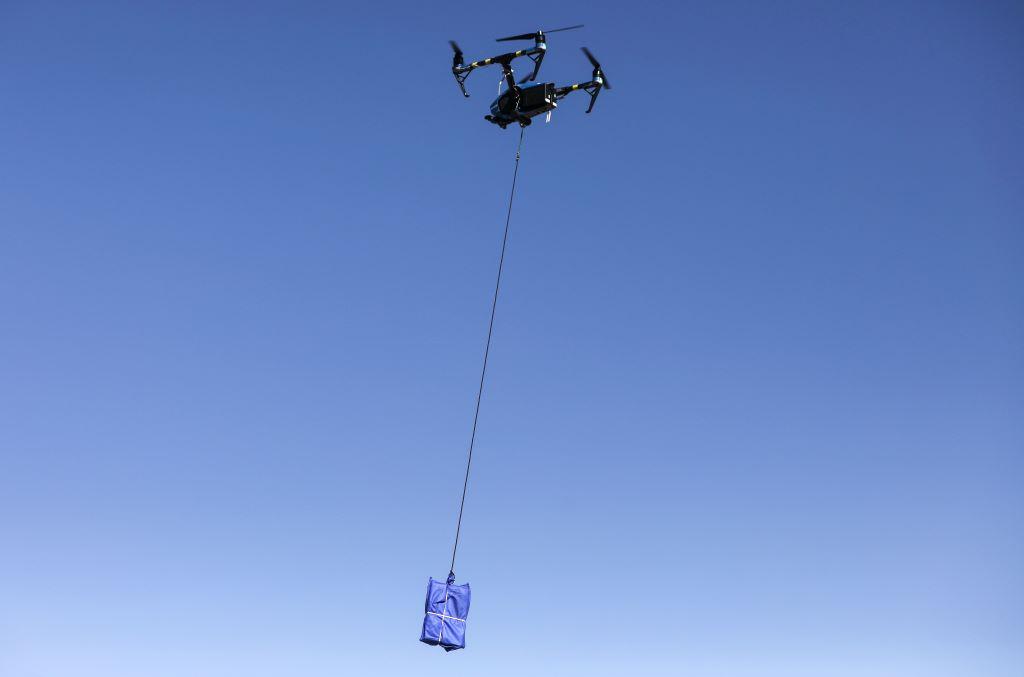Viewpoint: Flight Departments Of The Future Mean Opportunity

A test flight is flown by a DroneUp pilot in preparation for drone delivery of Covid-19 home self-collection kits from Walmart amid a Covid-19 surge in El Paso in 2020, in El Paso, Texas. Residents who lived within 1.5 miles of the Walmart Supercenter in East El Paso were eligible for the free kits as part of a drone delivery pilot program.
It’s an exciting time for the corporate flight department.
This segment of the market will help set a safe and scalable pathway forward into NextGen flight. Business aviation is, by nature, cloaked in a thick and unwavering commitment to prioritize safety above all else. The future flight department will have opportunities to take that goal with them as we progress digitally. The deep knowledge and understanding of general aviation practices are what will help enable the progression of new aviation technology.
Most recently, Walmart teamed with drone delivery giant DroneUp to service last-mile delivery solutions. In 2022, this partnership expanded with an aggressive goal of opening more than 34 DroneUp delivery sites nationwide by year-end. That has been a visible shift in the marketplace and has opened up conversations about sustainable responsibility that has become more comfortable over time.
Corporate giants, such as Verizon, have stepped into the spotlight by highlighting a business/general aviation safety standard in using uncrewed aerial vehicles to provide effective solutions. This company, along with other utility providers, uses drones for inspections on a regular basis. Verizon announced that it recently obtained a coveted ISBAO safety rating. This proactive safety practice highlights the company’s commitment to integrating current GA safety standards into the uncrewed environment as it looks forward.
Start-up drone innovation companies, such as San Diego-based PromoDrone and Las Vegas-based Brinc Drones, are using uncrewed aerial systems to aid mission-specific search and rescue professionals. These aircraft bring a layer of protection to our first responders and keep them physically out of harm’s way while alertly and proactively monitoring and managing the situation. General aviation applications for search and rescue, first responders, and health-related movements can now be handled safely and with accuracy.
As we look into the future of aviation, there is a keen eye on electric aviation. Electric vertical takeoff and landing aircraft, or eVTOL, provides a scalable and environmentally conscious solution for the overall well-being of the planet. It is a key force multiplier when we talk about NetZero 2050. Electric and even hydrogen solutions are being tested around the world. In fact, more than 750 electric concepts are presently listed with the Vertical Flight Society worldwide.
The future flight department will include team members that become specialists in new fields. We will be keen to implement socially sustainable goals when hiring, training, attracting and encouraging the ecosystem that supports future flight. Specialties, such as carbon offset, carbon neutrality and sustainable aviation fuel management will be a new spade for expertise. A step further into the future envisions electric battery and hydrogen management as well. Licensed dispatchers and those who understand FAA regulations like 14 CFR Part 135, Part 91, and Part 121 stand to gain significant career advancement as they will be in great need. We now open up new roles for remote pilots, advanced traffic management systems, maintenance and repair, to name a few.
The revolution of next-generation future flight is abruptly moving forward, and we are poised for a shift unlike we have witnessed for many decades.
We honor the lessons of the past as we adapt digitally and generationally to what lies ahead. As aviators, our commitment to prioritizing the utmost standard of safety will remain firm as we implement new ideas. As the industry makes room for new stakeholders, I can envision today’s experts collaborating with tomorrow’s change makers to focus on safe and equitable solutions.
As we step ahead in 2023, may we do so with excitement and vigor for we are all part of what is next. We will move forward with a gentle, deliberate hand to usher in an intentional and responsible future in the sky.
Toni Drummond is founder and CEO of Global Aerial Management Group, a company with a focus on UAS, AAM, electric aviation and sustainable aviation initiatives. Additionally, she owns multiple general aviation companies. She was the winner of the 2021 Women and Drones Team Innovation award and in 2022, was also named as one of the Top 100 Women to Watch in aviation & aerospace. Drummond is a member of the National Business Aviation Association’s Emerging Technologies Committee.



